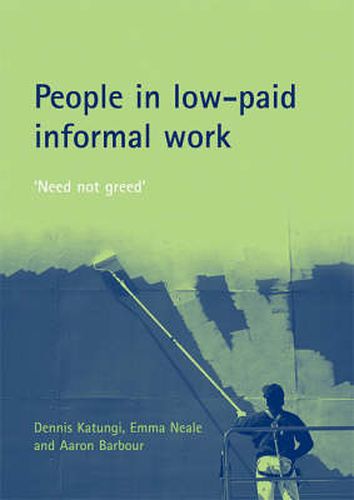Readings Newsletter
Become a Readings Member to make your shopping experience even easier.
Sign in or sign up for free!
You’re not far away from qualifying for FREE standard shipping within Australia
You’ve qualified for FREE standard shipping within Australia
The cart is loading…






Many theorists now give credence to the idea that those in informal paid work are an economic asset and that policy initiatives should be aimed at bringing them into the legitimate sphere. However, where people are on low incomes and face poverty, this presents a particular challenge.
This study examines the relationship between poverty and informal work. Exploring the experiences of people engaged in low-paid informal work, it contends that unless government seeks to understand and include the informal economy in its strategies, it will never be able to reach its employment, anti-poverty or regeneration targets.
The research shows that people in some deprived areas work informally - out of need, not greed -in response to poverty. Identifying low benefit rates, low wages and rules which limit the hours people can work as the three basic issues that underpin informal work, the report examines what works, and what does not, in tackling this activity. It provides in-depth evidence and a range of practical solutions to support and enable more people who wish to, to make the transition from the informal to formal economy. The report offers a greater understanding of the choices that people on low incomes are making and on how government policy and practice can better respond to these.
People in low-paid informal work is aimed at government decision and policy makers, politicians, national assemblies, regional development agencies, local authorities and statutory delivery agencies, businesses, the voluntary and community sectors, trade unions and think tanks, as well as the general public.
$9.00 standard shipping within Australia
FREE standard shipping within Australia for orders over $100.00
Express & International shipping calculated at checkout
Many theorists now give credence to the idea that those in informal paid work are an economic asset and that policy initiatives should be aimed at bringing them into the legitimate sphere. However, where people are on low incomes and face poverty, this presents a particular challenge.
This study examines the relationship between poverty and informal work. Exploring the experiences of people engaged in low-paid informal work, it contends that unless government seeks to understand and include the informal economy in its strategies, it will never be able to reach its employment, anti-poverty or regeneration targets.
The research shows that people in some deprived areas work informally - out of need, not greed -in response to poverty. Identifying low benefit rates, low wages and rules which limit the hours people can work as the three basic issues that underpin informal work, the report examines what works, and what does not, in tackling this activity. It provides in-depth evidence and a range of practical solutions to support and enable more people who wish to, to make the transition from the informal to formal economy. The report offers a greater understanding of the choices that people on low incomes are making and on how government policy and practice can better respond to these.
People in low-paid informal work is aimed at government decision and policy makers, politicians, national assemblies, regional development agencies, local authorities and statutory delivery agencies, businesses, the voluntary and community sectors, trade unions and think tanks, as well as the general public.